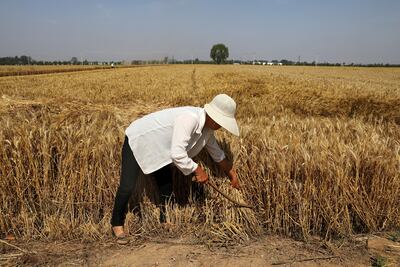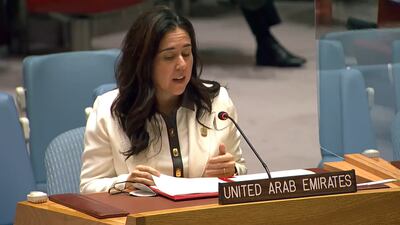The UAE plans to make the fight against climate change a centrepiece of its agenda when it assumes a seat on the UN Security Council next year.
Lana Nusseibeh, the UAE's ambassador to the UN, issued a call on Tuesday for member states to take more steps to mitigate climate change, deliver on their commitments under the Paris accord and boost multilateral spending on climate adaptation.
“We also see that the timeline is getting shorter and shorter,” Ms Nusseibeh said during a virtual Atlantic Council panel detailing the UAE’s climate strategy.
She framed it as a global security and women’s rights issue, emphasising that climate change leads to more natural disasters with adverse humanitarian consequences — with women particularly hard hit.
“This dual economy, security, gender approach on climate is really a pillar of our foreign policy as well as our multilateral engagement. And you’ll hear us talking a lot about it as we join the [UN Security Council] on January 1.”
The UAE has also placed a bid to host the annual UN climate conference in 2023. This year’s climate conference is set to begin on Sunday in Glasgow, Scotland.
Before the summit, the UAE has pledged to reduce its carbon emissions 23.5 per cent by 2030. It also announced this month that it intends to reach net-zero emissions by 2050, becoming the first country in the region to pledge to do so.
Ms Nusseibeh highlighted increased floods in island nations such as Kiribati, intense and more frequent hurricanes in the Caribbean and severe drought in places such as Africa’s Lake Chad region to illustrate the need for robust global emissions reductions.
“All of our indications and our horizon scanning unfortunately — without being too much of a doomsayer — is that these trends are going to increase,” said Ms Nusseibeh.
“We’re particularly aware of that in the Middle East, where we have the least water and the highest temperatures.”
Cop26 president Alok Sharma has pushed countries to submit ambitious emissions reductions goals before the summit to mitigate some of the most disastrous effects of climate change by keeping global warming to 1.5ºC above pre-industrial levels.
However, the BBC reported last week on leaked documents that show some wealthy countries have balked at providing aid to developing countries to help them transition to clean energy technologies.
The documents also revealed that certain wealthy countries have lobbied the conference to play down the need to move away from fossil fuels to decrease emissions.
Mariam Al Mheiri, UAE Minister for Climate Change and Environment, noted that the emirates first decided to diversify its economy by transitioning away from oil and natural gas 15 years ago.
“We want to be on the crest of that wave, not under it,” Ms Al Mheiri said at the Atlantic Council panel.
“That’s a decision that we took 15 years ago to explain why this seemingly counterintuitive policy became such a driving part of our foreign policy and our perspective globally.”
However, she emphasised that the move to clean energy is a transition, “meaning we can’t just switch off a tap".
“There is still a global demand for oil and gas,” Ms Al Mheiri said.
“As we ramp up the renewable energy, we’ll also be ramping down oil and gas production. But at the moment, there’s still a global need, so we will still be supplying.”
Ms Al Mheiri, who is also Minister of State for Food Security, highlighted how the UAE is taking steps to shield itself against the effects of climate change, particularly its impact on the global food supply chain. The UAE imports more than 90 per cent of its food.

She noted that the UAE is “looking into things like how we can or what we could grow” in the emirates while diversifying supply chains and reducing food loss and waste.
“We’re hoping that the UAE is not just a hub of free trade, which we are and which we want to continue,” she said.
“But we also want to become the hub for knowledge and innovation and how to grow foods in hot, arid climates like the UAE and share this knowledge with others who are suffering the same conditions as we are.”








